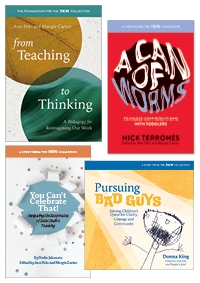ExchangeEveryDay Past Issues
 << Previous Issue
| View Past Issues | | Next Issue >>
<< Previous Issue
| View Past Issues | | Next Issue >> -Margaret Wise Brown
In the January/February issue of Exchange magazine, Rukia Monique Rogers challenges us to consider underlying assumptions of a ‘child-centered approach’ that is “steeped in Western culture of individualism, consumption, and capitalism. This cultural view of the child is often deficit based and fails to recognize children’s innate capabilities. Educators, for example, are told to provide multiples of certain items because young children are incapable of sharing. What idea about resources does this convey to children? Are they just to be individually protected or mindlessly consume? Do we believe that young children are more interested in material things than in forming relationships with each other?”
Rogers instead focuses on children’s innate connection with nature and on traditional ways of knowing to endorse an earth-centered approach: “In the African worldview, as in many Indigenous communities including Native Americans, land and the earth are imbued with spiritual energy that demands reverence and care… I propose that as early childhood educators, we begin to examine and reflect upon how we might borrow from and reignite these ancient cultural practices, so that children deepen their natural gratitude to find better ways to engage in a symbiotic relationship with the biosphere.”
Join the ROW Initiative to participate in an offering from Rukia Monique Rogers:
Unpacking Child-Centered Ideas with an Ethic of Care through the Lens of African and Indigenous Traditions,” on Wednesday, January 19, 2022, at 7 pm EST (New York).
NOTE: Once you join the ROW Initiative, you’ll receive a zoom link prior to the online event.
to save 20% on individual ROW titles, OR Save 25% on the ROW Collection Package |
ExchangeEveryDay
Delivered five days a week containing news, success stories, solutions, trend reports, and much more.
What is ExchangeEveryDay?
ExchangeEveryDay is the official electronic newsletter for Exchange Press. It is delivered five days a week containing news stories, success stories, solutions, trend reports, and much more.



Comments (2)
Displaying All 2 CommentsUnited States
Tamar, I like the term "child sensitive". Thank you for sharing!
-Tiffany at Exchange Press
Early childhood development and education consultant for early
Philadelphia, PA, United States
This is a truly interesting approach. I shall look into it further. I think we have become confused because we use the term: "child-centered." That certainly does sound deficit based. Lilian Katz has suggested rather using the term: "child sensitive." That would make us more inclined to relate to children and help them develop important relationships. In my book about attention - developing relationships is critical. When we just "give attention," that feeds into the child centered idea and confuses everyone.
Post a Comment